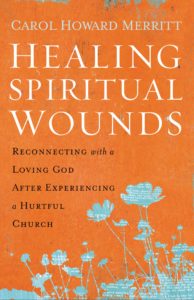 I’m ever grateful for the written work of colleagues whose words deepen the ongoing conversations about Church & faith in the 21st century.
I’m ever grateful for the written work of colleagues whose words deepen the ongoing conversations about Church & faith in the 21st century.
Carol Howard Merritt’s new book, Healing Spiritual Wounds: Reconnecting with a Loving God after Experiencing a Hurtful Church (HarperCollins 2017) is an important addition to these conversations, as she turns a practiced & pastoral eye on the Church and the ways in which it harms its own.
In the 21st century American context where the Church continuously rebrands itself against decreasing statistics & cultural prestige, the work of confession cannot be separated from efforts of relevancy. Contrary to popular complaints among church professionals about scarcity in the pews, Christians who reject the Church or keep their affiliations to a minimum are not merely distracted by Sunday soccer or satisfied to pray on a stroll through the park. More significantly, too many have not found the Church to be a sanctuary for their spiritual journeys. There are necessary lessons for the Church to infer from Healing Spiritual Wounds, and I encourage church professionals not to skim past these.
Carol, however, importantly & necessarily strives to speak foremost to those who have been harmed by the Church, its ministers, its theologies, and its communities. Such an audience may have no reason to trust a Church insider, but Carol does not offer light platitudes and she does not belittle spiritual pain. She vouches for the reality of the Church’s sins with her own story, and she shares several others’ experiences to give readers plenty of room to hear validation rather than dismissal of the Church’s harm.
Healing Spiritual Wounds is the gift of Carol’s retreat leadership in book form, complete with reflective opportunities and creative exercises to peel back the spiritual scabs and renew faith in God. The book is a deceptively easy read — the pages flip past like a good & heartfelt spiritual memoir — but each chapter does heavy lifting to unpack theology & sociology & history in order to give the reader permission to name spiritual wounds and to claim new, grace-filled understandings.
(I appreciate enormously that Carol does this work without falling into unhelpful categorizations of “conservative” or “liberal” theologies. She names the Church’s harms topically — emotional, physical, financial, spiritual, etc. — and through stories acknowledges that harm is caused by the Church across its theological/political spectrum.)
If the book can be faulted for being almost too simple in its effort to be accessible — at times I wanted the theological conversation to be more overt — nevertheless the aim of accessibility is important enough to overlook such a minor fault. Because the Church needs this book. Because people who have been hurt by the Church need this book.
As I was pleased to express in my endorsement: “Healing Spiritual Wounds is a gift of candid and caring space for those who have been hurt by the Church, and Carol Howard Merritt is a wise and gentle guide through the complex work of spiritual recovery. Welcome to a deeper, healthier faith journey.”

Trackbacks/Pingbacks